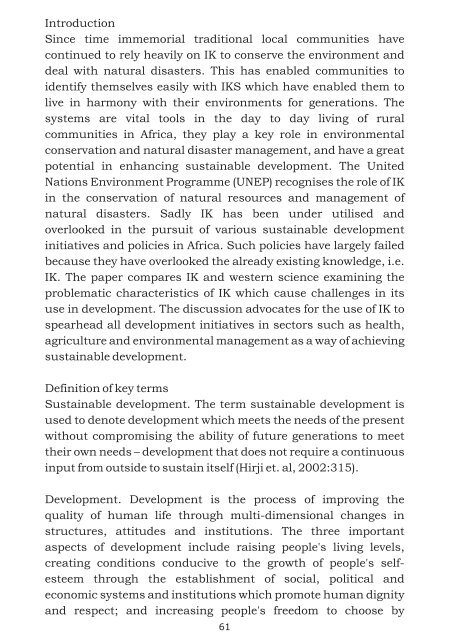Beneficiaries are actors too.pdf - Southern Institute of Peace ...
Beneficiaries are actors too.pdf - Southern Institute of Peace ...
Beneficiaries are actors too.pdf - Southern Institute of Peace ...
You also want an ePaper? Increase the reach of your titles
YUMPU automatically turns print PDFs into web optimized ePapers that Google loves.
Introduction<br />
Since time immemorial traditional local communities have<br />
continued to rely heavily on IK to conserve the environment and<br />
deal with natural disasters. This has enabled communities to<br />
identify themselves easily with IKS which have enabled them to<br />
live in harmony with their environments for generations. The<br />
systems <strong>are</strong> vital <strong>too</strong>ls in the day to day living <strong>of</strong> rural<br />
communities in Africa, they play a key role in environmental<br />
conservation and natural disaster management, and have a great<br />
potential in enhancing sustainable development. The United<br />
Nations Environment Programme (UNEP) recognises the role <strong>of</strong> IK<br />
in the conservation <strong>of</strong> natural resources and management <strong>of</strong><br />
natural disasters. Sadly IK has been under utilised and<br />
overlooked in the pursuit <strong>of</strong> various sustainable development<br />
initiatives and policies in Africa. Such policies have largely failed<br />
because they have overlooked the already existing knowledge, i.e.<br />
IK. The paper comp<strong>are</strong>s IK and western science examining the<br />
problematic characteristics <strong>of</strong> IK which cause challenges in its<br />
use in development. The discussion advocates for the use <strong>of</strong> IK to<br />
spearhead all development initiatives in sectors such as health,<br />
agriculture and environmental management as a way <strong>of</strong> achieving<br />
sustainable development.<br />
Definition <strong>of</strong> key terms<br />
Sustainable development. The term sustainable development is<br />
used to denote development which meets the needs <strong>of</strong> the present<br />
without compromising the ability <strong>of</strong> future generations to meet<br />
their own needs – development that does not require a continuous<br />
input from outside to sustain itself (Hirji et. al, 2002:315).<br />
Development. Development is the process <strong>of</strong> improving the<br />
quality <strong>of</strong> human life through multi-dimensional changes in<br />
structures, attitudes and institutions. The three important<br />
aspects <strong>of</strong> development include raising people's living levels,<br />
creating conditions conducive to the growth <strong>of</strong> people's selfesteem<br />
through the establishment <strong>of</strong> social, political and<br />
economic systems and institutions which promote human dignity<br />
and respect; and increasing people's freedom to choose by<br />
61


